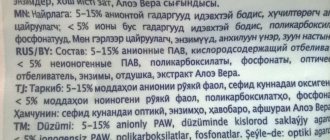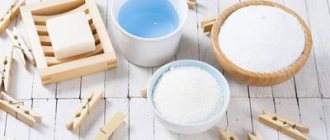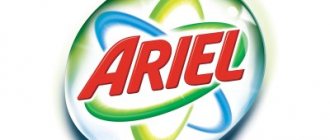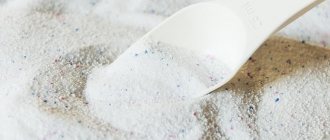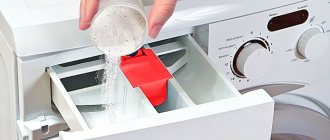Today, almost every housewife uses washing powders, and this does not even depend on whether there is a washing machine in the house. In stores you can buy powder for both machine washing and hand washing. There are those that are designed for children's underwear, for colored or black... To save time and budget, many housewives buy detergents for future use. In addition, various promotions are often held at retail outlets, and it is possible to purchase them inexpensively and in large quantities. And here it is logical to ask the question: how long can this product be stored? What is the shelf life of washing powder?
Why are expired household chemicals harmful?
Washing powders are, first of all, chemicals, so the terms and storage conditions must be treated with due attention. Almost all such products have a limited time of use. Finding out if there is an expiration date is quite simple. This information must be indicated on the packaging. You can verify this by picking up any powder of a well-known brand, for example, Myth, or Losk.
The quality of the detergent affects not only the result of cleaning things, but also human health. It contains surfactants that help remove dirt, but can also have a negative effect on the skin of the hands, especially if it is expired. In addition, the use of low-quality products can cause allergic reactions of the respiratory tract, skin irritation in the form of rashes and eczema.
Choosing washing powder
For many housewives, when choosing household chemicals, the issue of price is not in last place. On store shelves there are powders of a higher price category, such as Ariel, Tide, as well as budget-level brands: Biolan, Lotus and others. Many people believe that an expensive product has better properties, but this is not always true. First, you need to pay attention to whether the product has passed certification. It is especially important to make sure of this before purchasing products for washing children's clothes.
Without a doubt, the product must be well packaged in appropriate original packaging that is free of visible damage. Powder in a plastic bag, which is sold by weight, raises doubts about the guarantee of its quality, so it is better to refuse such a purchase.
Perox
A universal cleaning product that can also be used for laundry is bleach, but it does not contain chlorine. This product copes well with all types of dirt and stains, and to add fragrance to the laundry, you can drop a couple of drops of any synthetic fragrance into the drum. For one wash cycle you will need about 100-150 ml of product.
As you can see, you can often do without powder, but provided that you choose the right replacement, even if it’s temporary.
AlinaAuthor of the article
Did you like the article?
Share with your friends:
Shelf life of the powder
So, having chosen a product of a certain brand with a suitable price, you need to inquire about the expiration date of the washing powder and its storage conditions. Conscientious manufacturers indicate all this information directly on the packaging. For example, the packaging of Persil powder indicates a shelf life of 3 years in a closed container from the date of production, while Myth and Bimax can be stored for 2 years.
If the date of manufacture and terms of use could not be found, or they are written in too small a font, you should contact the seller for help.
Approximate shelf life of laundry detergents:
| Closed container/ |
open
Bleach must be replaced if it is not used after six months.
Most furniture polishes have a service life of up to two years.
Hydrogen peroxide, if left unopened, should keep for about a year; if opened, should be used within 60-90 days.
Shelf life shouldn't matter for microfiber products, but how long they last depends on care. As long as a product's microfibers are not exposed to softeners or detergents that contain them, and high-temperature drying is avoided, they can last over 100 washes. “However, if they start to darken or become discolored, you will likely have to dispose of them.”
Conditions that negatively affect the safety of laundry detergents
So, the laundry detergent was purchased in compliance with the basic rules: the quality of the product is confirmed by a certificate, it is in the original packaging without damage and has the appropriate production date. Can you be sure that this product will not lose its qualities throughout the entire period of use? It turns out not.
You need to know that there are several factors that can deteriorate the quality of laundry products:
- Storage at elevated indoor temperatures. High air temperature accelerates chemical processes in powder granules, so it should not be stored, for example, near heating devices.
- Constant exposure to direct sunlight. When exposed to sunlight, the active components of the product begin to lose their properties and effectiveness.
- Room humidity is too high. The influence of moisture leads to the formation of lumps, which affects the quality of the wash itself. Sometimes such powder seals do not dissolve well in water and negatively affect the operation of the washing machine mechanisms.
- Open container. This storage method will not prevent the absorption of excess moisture. In addition, the properties of active substances and the smell of flavors will be lost. If after opening the package it is impossible to close it, use an additional bag or special reusable containers for bulk substances.
Based on this, let's look at how to properly store laundry detergent at home:
- If there is a child in the family, first of all, you should remember that all household chemicals should be kept out of his reach.
- A shelf or other place where household chemicals are located should be located as far as possible from heat sources.
- The product must be protected from exposure to direct sunlight, and the room temperature should not be higher than 35°C. You should also pay attention to air humidity, which should not exceed 95%.
- After each use of the product, you must remember to securely close the packaging or additionally put it in a bag.
- Hygiene and skin care products should not be located near washing chemicals. (sponges, toothbrushes, bathing soap, etc.). This can lead to unwanted chemical contact with the skin and cause allergic reactions.
It is also important to follow simple rules when using powders: do not inhale them during operation, avoid prolonged contact with skin, do not touch the powder intended for the machine with your hands.
If lumps begin to form in the powder, this is a signal that it is beginning to lose its qualities. The correct solution in this case would be to replace it and dispose of the old product.
With the right choice of washing powder and proper attention to its storage, washing will always be easy and flawless. And the freshness around will give you pure thoughts and a confident gait!
The time during which the active chemical compounds function fully is considered to be the shelf life of the washing powder.
The legislator stipulates a storage time of 9 months for products containing whitening products or dietary supplements. For everyone else, this period is set by the manufacturer.
What is regulated
- GOST 32479-2013 “Laundry detergents”. Establishes general requirements for life safety, public health, and environmental protection.
- GOST 25644-96 “Synthetic powder detergents”. Applies to raw materials, technical requirements.
- GOST 22567.5-93 “Synthetic detergents and surfactants.” Regulates the method for determining the pH of aqueous solutions.
- GOST 52488-2005. Applies to powdered, granular, agglomerated, molded, paste and liquid household laundry products.
Marking
The product data list includes the following:
- Name;
- what method: automatic, manual, station wagon;
- types of fabrics;
- machines: professional, automatic, activator type;
- amount of ingredient by type of wash;
- compound;
- normative and technical act;
- manufacturer (country, address, company);
- warning notices;
- weight or volume of a substance;
- storage conditions;
- disposal method;
- shelf life, date of manufacture, expiration date;
- how long can it be stored?
- barcode;
- dangerous moments of use, how to avoid them;
- Can it be used after the expiration date?
ATTENTION: the text and pictures on the packaging must be well and clearly printed, this protects against counterfeiting.
How to store it correctly
Washing powder releases toxic products. When choosing a storage location, you need to remember several conditions:
- ensure inaccessibility for children and pets;
- prevent proximity to food and household items;
- Do not store in hot rooms, near heating radiators, or in the bathroom.
If the package is closed, high temperature may have a negative effect. Active substances decompose and become unusable. Open containers are affected by humid environments. From a crumbly substance, the laundry product turns into a stone formation.
IMPORTANT: it is convenient to store the powder directly close to the washing machine in a dry, inaccessible place.
A practical and reliable storage place is a plastic container with a lid lock. Children, and especially animals, will not open the storage; it will protect the powder from moisture, direct exposure to sunlight, and spillage during transportation.
Appropriate place
Finding a storage location, despite the apparent simplicity of solving this issue, in practice often turns out to be quite problematic. For reasons of economy, many housewives prefer to buy powder in large packages (6-9 kg). This pack takes up quite a lot of space. Bathrooms and toilets in most apartments cannot boast of dimensions. Storerooms are also not provided for in the layout everywhere.
The very first criterion that you should follow when choosing a storage location is that it is inaccessible to pets and small children. Both of them, for inexplicable reasons, really like the smell of washing powder. This especially applies to cats. Any plastic or cardboard packaging that they can reach is guaranteed to be torn and the contents scattered all over the floor. It's good if you get there before they taste it.
Do not store washing powder in living areas or kitchens. Its smallest particles, released into the air even from unopened packaging, settle on food, furniture, clothing, and so on. Then they enter the body.
Find a high, closed shelf for the powder (suitable for small cardboard packages) or a cabinet with airtight doors (ideally with a magnetic lock) in a pantry or closet. The bathroom is less acceptable due to constant high humidity. Apart from household chemicals, nothing else should be stored there. This is especially true for towels, sponges and washcloths, hygiene products, children's toys, food and dishes.
Is it possible to use expired
After the expiration date, the detergent becomes less effective. Aggressive elements lose their activity and do not bring the expected results.
When the substance comes into contact with air, it oxidizes, chemical compounds change in composition, causing an allergic reaction. Particles of spoiled powder are not sufficiently washed out of clothing and irritate the skin and respiratory tract. This is fraught with various complications for the body.
If a person suffers from bronchial asthma or allergies, the use of expired powder is unacceptable, and for healthy people there will be no benefit from household chemicals that have become unusable.
Many housewives never check the expiration dates of industrial products. Is it possible to wash with expired powder, how will the quality of washing change, does the expiration date affect the fabric, color saturation? Let's try to figure it out.
Residual effect?
Surfactants remaining in fabrics after washing can be dangerous to people. To evaluate this indicator, the surfactant content is checked not in the fabrics themselves, but in the water remaining after washing and the third rinse. The logic of this test is as follows: if after repeated rinsing surfactants still continue to be washed out of clothes and linen, then they are in the fabrics, and the more surfactants are in the water, the more of them there were in the fabric. The maximum amount of anionic surfactants remained in the water (and therefore in the laundry) after washing with Ariel powder. Least of all - after Dosia powder.
How to wash a down jacket and get rid of scale? 6 myths about washing machines
We recommend: How to properly wash fleece
Is it possible to wash with expired powder?
The shelf life of the average washing powder is from 3 to 5 years from the date of production, but it all depends on the manufacturer. During this time, the chemicals are fully functional. What happens after the expiration date?
An expired powder gradually loses its cleaning properties. Many pollution will be too much for him to handle.
The shelf life depends on the composition of the product, in particular, dietary supplements. The quality of powders is affected by storage conditions. When closed, they can lie for a long time and not lose their properties; when opened, the shelf life is reduced. Excessive humidity, high temperatures (from sunlight, batteries), and contact with other products spoil the product.
Advice from Miss Clean magazine: Do not buy cleaning products without the manufacturing date indicated on the packaging.
What to do with expired powder
First, identify an expired product: it clumps, hardens, acquires a strange and strong odor, and changes color.
Washing with expired powder will not be of good quality. Also, using expired products is fraught with skin irritation: granules, especially outdated ones, are difficult to wash out when rinsing. Irritation of the mucous membranes is possible when inhaling such products.
Never wash children's clothing with expired detergent; throw away the pack if you suffer from allergies or asthma.
If the product is not suitable for washing and it’s a shame to throw it away, try using it to wash some surfaces.
Tip Store the powder in an airtight plastic container in a cool, dry place, near the washing machine.
The expiration date is indicated for a reason: it is better to use the powder before its abilities wear off. Take care of your health: a pack of new laundry detergent is not that expensive.
| Washing powder | Fabric softener | Laundry capsules | Whitening products | Stain remover in powder form | |
| Closed container (from the moment of production) | Year | Up to three years | Up to fifteen months | Twelve months | Has no expiration date if stored properly |
| Open container (from the moment the package is opened) | Six months | Six months - a year | The advantage is that the container is opened only before washing | Twelve months, after six months of autopsy the quality deteriorates | Has no expiration date if stored properly |
| Closed (years) | |||||
| Air conditioner | 12 |
Adviсe
Many people, in order to save money and time, try to purchase goods in large quantities, including washing powder. The stores themselves contribute to this by offering daily promotions to reduce costs when purchasing goods in large volumes.
We advise you to approach the purchasing process more consciously and buy goods in the amount that you can use within a year. Then it will be easier for you to control its expiration date and not look for additional storage space.
If you still decide to purchase powder in large quantities, then it is better to choose small packaging, this will allow you to avoid opening all the packages at once, but gradually, which will have a beneficial effect on the storage time of the product.
Buy plastic containers for storing powder; they are sold at any hardware store or hypermarket (Fix Price, IKEA, Obi, etc.). This is very convenient, the tightly closing lid prevents the spread of odors throughout the apartment, and a reliable latch will not allow your children and animals to get to the contents of the container.
